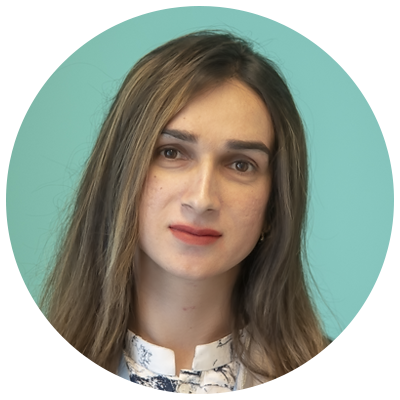‘Being a consultant with the United Nations Development Programme (UNDP) for greater inclusion of gender minorities has been a journey for me. Not just a personal journey of moving cities or learning new things each day, but a journey towards inclusion, a journey from social exclusion to the mainstream, and most importantly a journey from being a transgender person to being just a human being.’
Today I sat and listened to members of transgender communities from Khyber Pakhtunkhwa and Sindh provinces raise their issues. These were transgender persons from the grassroots, like me, who raised very basic issues such as recognition of their identity, access to opportunities, healthcare, psycho-social support, gainful employment, engagement opportunities, justice, and most importantly, the need to promote respect and freedom.
Arzoo, a transgender person from Khyber Pakhtunkhwa province, despite facing violence was joining forces with other transgender persons so that she could play an active role in improving the quality of life for fellow transgender persons. Aarzoo is a guru (teacher) for numerous transgenders and is widely respected for her contribution to transgenders’ activism. The first transgender lawyer in Pakistan, Nisha Rao shared her struggle of paying her way through law school by begging on the streets dressed as a male. She came out with her identity in law school and struggled throughout her years there to fit in. She remained resolute and is now giving back to the community by sensitizing the local population, government officials and students in colleges and universities to accept transgender persons as part of the society.
Listening to my peers, I couldn’t help but feel proud of how far I have come, how I have learnt and how I have contributed to promote inclusion. ‘I was very proud, as this was an event which I had organized with the support of my colleagues….who would have known that I could come such a long way!’.
All my peers were encouraged by UNDP’s recruitment of a transgender person – and they perceived it as a sign of recognition and acceptance. This was an action that went beyond just promises and instead produced actual results!
My story is that of a typical transgender person: coming from a rural area in Pakistan in Punjab with limited opportunities, being rejected by my family, forced to make various compromises in order just to survive, living with limited resources, facing abuse, violence and never ending discrimination – the kind which is so consistent that being respected makes you feel awkward – in short, feeling like a second grade citizen with no savior in sight. I could never have thought I could be a part of something bigger than just trying to survive on a daily basis – let alone leading change in a reputed organization like the United Nations.
‘During my initial days working at UNDP, I could not help but think about the possibility of silent judgements coming from people I interacted with. It took me some time to be at ease with my surroundings; to get used to the respect I was getting from everyone. I felt I could say or do something which can help others like me. Why couldn’t all transgenders feel this respect – feel what being societally acclaimed ‘normal’ is like – what feeling at ease is like. I quickly realized that it was up to me to decide how well and how much I can contribute. I had to step up and take responsibility – I had to prove myself not just in my personal capacity, but I felt that I was the custodian of my community’s reputation’.
Alisha is part of UNDP’s Youth Empowerment Programme which supports youth development through investment in the 3E Framework (Education, Engagement and Employment). To mainstream and ensure inclusion of gender minorities, Alisha provides feedback on programme/project design of various interventions to make them relevant and appealing to transgenders. She advises on application forms and IEC content to ensure that it responds to transgenders needs and to simplify the language so that it easier for them to apply. She also provided inputs on Terms of References for work which UNDP planned to undertake in 2019, to make it more inclusive and gender sensitive. ‘This experience was revolutionary for me as I was contributing at a larger level. I was inspired by the work we were doing – I felt like I was paving pathways for other transgenders, so that they can apply and benefit from various strands of Youth Empowerment Programme work.’
Alisha considers her freedom of speech a super power — being able to voice her opinions and perspectives has boosted her confidence in herself and in her identity. She feels she has a lot more to learn and given the time and opportunity she wants to mainstream transgenders into broader processes including the policy making and law enforcement spheres.
‘The trust and affection from UNDP’s team made me realize that to live a dignified life, I do not need to change, or pretend to be someone I am not – I can lead the change being as I am. My identity, my non-conformity is my strength’.
Authors:
Yusra Qadir
Youth Engagement and Social Inclusion Specialist
Yusra Qadir works at UNDP as Youth Engagement and Social Inclusion Specialist. She has rich experience of working with civil society, vulnerable groups and public institutions for driving long term development efforts. Mainstreaming vulnerable groups in governance processes, working on meaningful social inclusion and evidence basedadvocacy are her primary interests
Alisha Shah
Coordination Consultant for Gender Minorities
Alishah works at UNDP as a Coordination Consultant for Gender Minorities with the Youth Empowerment Programme. She has an MPhil degree in Education Planning Management (EPM) from Bahauddin Zakaria University Multan and has experience working with Engro Foods Company as assistant accountant. In her current capacity as Coordination Consultant, she is working with the Youth Empowerment Project team and development partners to ensure inclusivity in all programme activities.

 Locations
Locations






